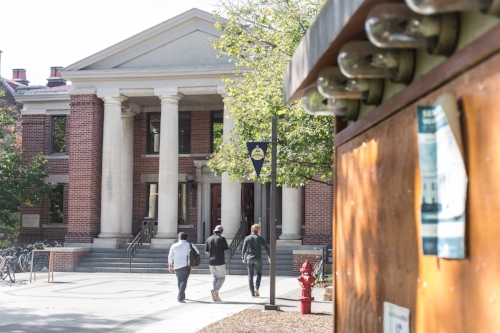By now, seniors should have all their acceptances, denials, and waitlist announcements back, and they have until May 1 to decide and make a commitment.
If you've been waitlisted at your top-choice school, read my advice here. If you've narrowed it down to two very different schools, start here.
I'm assuming by this point you've already checked all the major information you might want to know about the schools you're considering, things like "can I afford it?", "what's the graduation rate?", and "what's the student-faculty ratio?". You may also be going back for on-campus visits at some of the schools who have accepted you.
I'd like to throw out a few other things you should research before choosing a school. I seriously doubt any of these factors are going to be The Deciding Factor. However, if you end up just "going with your gut feeling" on April 30, these are some things that may end up affecting your gut feeling.
What is the average daily temperature on September 5, January 10, March 15, and May 30? We all know, in general, that it's colder up north and warmer down south. But you'll want something more specific than that. What is the weather likely to be on your first day of class in fall, the first day of class in the spring, Spring Break, and the last day of class?
How much it will cost to get there and back? How long will it take? If you will be driving from home to college, how long is the drive? Will you need to stop overnight? How much gas is that going to take? (More on gas soon.) If you fly, how long is the flight? Are there non-stops, or do you take multiple flights? How expensive is that? How likely--and possible, even--is it for you to visit home during the year? How important is that to you?
What is the school's sophomore retention rate? That is, how many first-year students come back to the school for a second year? All the schools you're considering probably have similar rates, but any that are significantly higher or lower than the others should get your attention. To get a high retention rate, a school has to do just about everything right: interesting classes, helpful financial aid, and a reputation for being worth the cost and trouble. Take notice of which schools on your list do this better than others.
The only ranking that matters at this point: is the school on the list of Top Party Schools? Every year Princeton Review ranks the top party schools. They also rank "Stone Cold Sober Schools," which is the opposite. Party sounds fun and positive, but keep in mind the way that these schools are ranked: "Schools on the "Party Schools" list are those at which surveyed students' answers indicated a combination of low personal daily study hours (outside of class), high usages of alcohol and drugs on campus and high popularity on campus for frats/sororities." If they were to re-title the list "top schools for drunks who don't study" would it sound so fun and exciting?
Compare the size of the campus to the size of its home town. For example, Boston University, University of Southern California, and University of Louisiana at Lafayette have similar numbers of undergrad students. B.U. is in a city of almost 700,000, U.S.C. is in a city of almost 4 million, and Lafayette has around 127,000 people. Those are very different contexts.
How diverse is the school? What's the racial/ethnic breakdown? How much of the student body comes from out of state? How much of it is international? How important is it to you to have a chance to study and learn with people who are different than you and have different backgrounds?
How much is the price of gasoline? If you'll be driving, the amount of money you have to pay to keep your tank full can be quite different depending on where you are. Going to school in an expensive-gas state has a different cost of living than going to a cheap-gas state. Check here to know where the different areas are.
What will your tie-breaker be? If you just cannot decide between two schools, what will you use to make a decision? Most people would use price, but what if they both cost the same? Will you choose the closer school? The larger school? The one whose basketball team has a better record? Seriously, thinking now about how to break a tie can help you understand a little better what your priorities are, and that can go a long way.
Best of luck to all the seniors making this big decision right now. If you have other considerations, whether serious or quirky, leave a comment. It's easy to follow Apply with Sanity on Facebook and Twitter.
Photo by Angela Elisabeth Portraits


